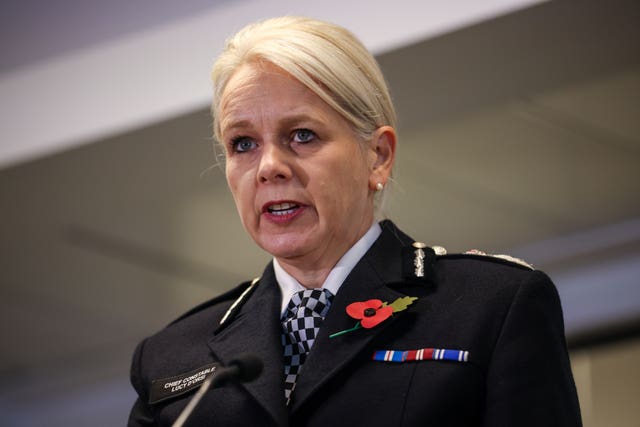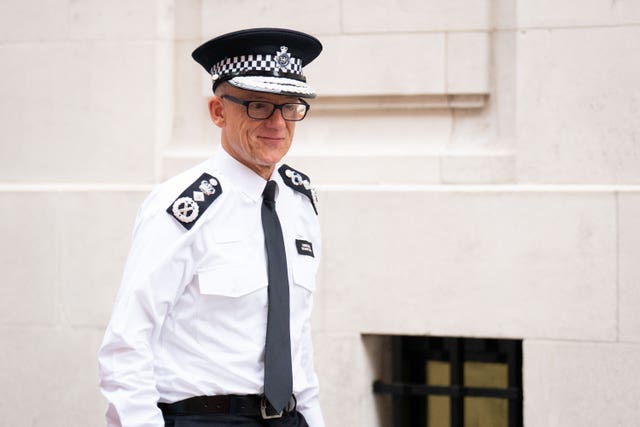Police legitimacy ‘hanging by a thread’ after Carrick rape case, say chiefs
Chief constables Lucy D’Orsi, Lee Freeman and Iain Livingstone have spoken out after serving officer Carrick’s 18-year campaign of abuse was revealed.

Police chiefs have said legitimacy in the profession is “hanging by a thread” after rapist David Carrick was exposed – and called for reforms to make it easier to catch other serving offenders.
Chief Constable of British Transport Police (BTP) Lucy D’Orsi expressed her shame and anger that a fellow officer had been free to carry out his 18-year campaign of abuse.
Humberside Police’s Chief Constable, Lee Freeman, called it “one of the darkest weeks for policing that I have known” in his career of nearly three decades.
On Monday, former Metropolitan Police officer Carrick, 48, admitted 49 criminal charges including 24 counts of rape against 12 women, making him one of the UK’s most prolific known sex offenders.
He was only suspended from duty in October 2021 when he was arrested for rape, and his pay was finally stopped in December 2022 when he admitted the majority of the criminal charges he faced.
The former officer, who was sacked from the force on Tuesday, used his position within its ranks at first to win over his victims’ trust and later to intimidate them.
In a blog post on the BTP website, Ms D’Orsi warned that gaps in the current system could allow other serving offenders to “fall through the cracks” and called for a debate on “regulatory reform”.

“Yes, you read that correctly. On arrest, my DNA and prints would be taken and checked against national forensics databases.
“Even though I’ve provided my biometric samples to the police (my employer), the datasets are not run together to identify a match.
“As it stands today, I could be arrested by the police and nobody but me would know I am the police. In my view, this is a priority issue for our attention. Otherwise, others could fall through the cracks and go on to do harm.”
The chief constable said she was “angry” that Carrick used his status to gravely harm women and felt “shameful” that he was free to abuse his victims for so long without alarm bells ringing.
“At times like this, I find myself awake at night wondering how we can strengthen our approach, stopping the likes of Pc Carrick from the very moment an allegation is made,” she said.
Her thoughts were echoed by Mr Freeman, who said public trust in the profession will continue to erode unless police move from being “the silent majority to being active guardians of our culture and behaviours”.
“Here in Humberside, I feel that we have a collective responsibility to reflect and recognise that the events in London also directly impact on us and how our communities see us,” he said.
“Indeed, this is already having an impact.
“I feel that the case of Carrick, along with other prominent cases that regrettably precede it, means police legitimacy is hanging by a thread.”
Mr Freeman said it is “hollow and indefensible” to claim incidents in which officers use their status for sexual gain or misconduct are similar to cases in other professions where teachers or doctors have abused their position to cause harm.

“As members of the police service, many of us have the right to take away another person’s liberty, by the use of force if necessary, and detain them for up to an initial 24 hours.
“This power is conferred to us on the basis that everyone of us is completely trusted.
“Right now, I feel that this trust has been severely damaged.”
Chief Constable Sir Iain Livingstone, speaking after he was knighted at the Palace of Holyroodhouse in Edinburgh on Wednesday, said: “(Carrick’s offending is) absolutely outrageous and despicable conduct from an individual who should have never been in the police service.
“Police officers are drawn from the public, the public are the police and the police are the public and nowhere is that truer (than) in Scotland, but we need to earn that trust and that’s something we do every single day.”
It comes after the Home Secretary said all police forces will be asked to check staff against national databases to identify if anyone “slipped through the net”.
Carrick’s case is the latest in a series of damaging scandals for the Met, including Sarah Everard’s murder, offensive messages exchanged by a team at Charing Cross, and the strip-search of a teenage girl at school while she was menstruating.
Met Commissioner Sir Mark Rowley said weak policies and decisions meant the serial rapist was able to stay in the force for so long, adding that the force had “let London down”.
Sir Mark had told the PA news agency, earlier in January, that the capital was a “fantastically safe” city – but acknowledged that hundreds of officers within the Met’s own ranks need to be rooted out.
More than 1,000 Met officers and staff who have previously been accused of domestic abuse or sexual offences are now having their cases reviewed.
Following Carrick’s conviction, the Commissioner was asked if he could guarantee a woman visiting a police station to report a sexual offence will not meet an officer whose past behaviour is under review or who is tolerating similar conduct in their department.
“I can’t. I’m not going to make a promise that I can’t stick to,” he told ITV’s Good Morning Britain.
“I’m going to put in place ruthless systems to squeeze out those who shouldn’t be with us.”





